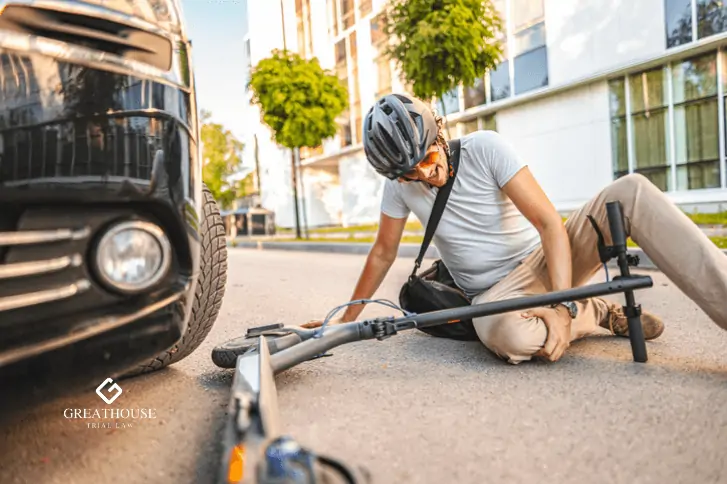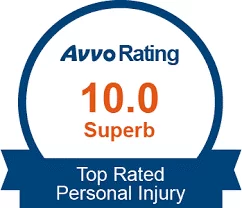Concussion

Signs of a Concussion after a Car Accident
This may seem like a scary fact, but the truth is that emergency rooms across the United States will not recognize up to 85 percent of traumatic brain injuries (TBIs) in car accident victims. Not recognizing concussions or TBIs isn’t always the fault of medical professionals. There are also many cases in which people who suffer from a concussion or TBI as a result of a car accident will simply walk away from the crash without going to the ER or getting professional medical care only to find out later on that they suffered a disabling brain injury.
Concussions and TBIs are hard to detect even when people get proper medical treatment because our brains will go into a hyper-metabolic state to protect itself after a serious trauma, which makes it hard for CT scans and MRIs to be effective. When the brain is in a hyper-metabolic state, there will be a drastic uptake in glucose that can actually mask many concussion and TBI symptoms, and for the most part these symptoms tend to get worse once the glucose levels decrease over time, which then causes more brain damage.
This is why many symptoms of concussions after a car accident won’t appear right away and may take hours or even days to reveal themselves. Many people who suffer a concussion in a car accident will seem fine on the outside, but on the inside they are feeling differently.
What this article aims to do is help everyone fully understand the magnitude that concussions can have on someone after a car accident and how to notice concussion symptoms in yourself as well as your loved ones. By going through the information on this page you’ll better understand the comprehensive overview of what a concussion is, the general signs and symptoms in adults and children, information on when to see a doctor, and diagnosis and treatment plans for concussion victims.
What is a Concussion?
A concussion is a mild TBI that is caused by a blow or ding to someone’s head in which the brain bounces back and forth inside the skull upon the impact. The harder the brain crashes up against the skull and counter blows on the opposite side of the skull from the location of the blow to the head, the more serious the concussion. It takes a serious impact to cause the brain to crash up against the skull, but when this happens; brain bruising, bleeding and the tearing of nerve fibers occurs.
You don’t have to temporarily lose consciousness or memory of the impact to have suffered a concussion, although some people do show these kinds of obvious symptoms for serious concussions. Concussions are graded by the following severities:
- Grade I — this is when there is no loss of consciousness and amnesia doesn’t occur or only occurs for less than 30 minutes
- Grade II — a concussion in which the victim suffers a loss of consciousness for less than five minutes and amnesia for 30 minutes up to 24 hours
- Grade III — this concussion includes a loss of consciousness for over five minutes and amnesia for over 24 hours
Signs and Symptoms of Concussions
There are many symptoms and signs of concussions that everyone should know about, and they can occur from several different types of injuries, not just car accidents. Concussion symptoms can begin immediately or develop hours or even days after an injury.
The symptoms of a concussion fit into four different categories, including the following:
- Cognitive
- Not being able to think clearly
- Trouble concentrating
- Feeling slowed down mentally
- Not being able to retain new information/short-term memory loss
- Physical
- Severe headaches
- Dizziness
- Nausea
- Consistent vomiting
- Blurry vision
- Sensitivity to noise or light
- Problems balancing
- Feeling lethargic or having no energy
- Emotional/Mood
- Sad
- Anxious or nervous
- Easily angered or upset
- Hyper-emotional
- Sleep
- Sleeping more than normal
- Sleeping less than normal
- Insomnia
It’s important to understand that there are concussion signs that happen right after an impact to the head that can be noticeable, and some of the immediate symptoms include the following:
- Loss of consciousness
- Vacant stare/impaired attention
- Delayed response
- Incoherent or slurred speech
- Disorientation
- Lack of coordination
- Memory problems
Although young children and babies can have the same concussion symptoms as adults, it can be much more difficult to tell if a small child has suffered from a concussion because they don’t understand what’s happening to them. The following are some concussion symptoms to look out for in young children:
- A headache that won’t go away
- Crying much more than usual
- Changes in ways they act or play with friends
- Changes in how they sleep, eat or nurse
- Getting upset easily and throwing frequent temper tantrums
- Having a sad mood often
- Lack of interest in usual activities or toys
- Loss of newly acquired skills, like potty training
- Trouble walking or loss of balance
- Trouble paying attention
When To See A Doctor
It’s always smart to see a medical professional after any car accident. Even if you don’t require emergency care after an accident, it’s smart to see a doctor if you or a loved one has any kind of head injury.
When it comes to a child suffering a concussion, you’ll want to focus mainly on a child’s behavior after you’ve noticed or seen them fall on their head. If they are active, have normal sleeping patterns and don’t seem different after getting a small bump on their head, then they should be fine and not need to see a medical professional. You should seek emergency care for a child or an adult if they experience any of the following symptoms days after a head injury:
- Repeated vomiting
- A chronic and persistently worse headache
- Behavioral changes, like severe irritability
- Loss of consciousness
- Clumsiness or stumbling
- Disorientation or difficulty recognizing places or people
- Slurred speech
- Seizures
- Abnormally dilated pupils
- Lasting dizziness
- Any other symptoms that tend to get worse as time goes on
Concussion Diagnosis
After someone is injured in a car accident and taken to a medical expert, the expert will conduct a few evaluations testing the person’s short-term memory, alertness, long-term memory and attentiveness to complex tasks (ex. reciting months backwards).
When someone is in the ER, they’ll get an exam of their head and the doctor will ask about any symptoms and get an overall description of how the injury occurred. A doctor will also test a patient’s balance, coordination, strength, sensation and reflexes, as well as conduct several problem-solving tests.
Neuropsychological tests have been used more in recent years to help diagnose concussion patients, and many times a CT scan or MRI will be needed too. Sometimes when a person has a severe concussion, they’ll be admitted to the hospital for overnight treatment and observation. For most mild concussions, the patients are released within a few hours, but the family or friends of the patient are required to watch the patient for any kind of behavioral changes over the next 2 days.
“As a former felony prosecutor, I believe that there is no fight that is too small or too big to fight when seeking justice for my clients.”
Concussion Treatment
Rest is the best treatment for a concussion, and it’s important to take resting seriously when you are in the rehabilitation stages after a car accident. Sometimes it can take months for the brain to fully heal from a serious concussion, so long-term resting periods are very necessary and you can’t go back into any kind of sports or strenuous physical activity during this time period.
If your child is rehabilitating from a concussion, it’s important to monitor how much screen time they have because TV, smart phones, computers and tablets can over-stimulate their brains. Your child may also need to avoid riding bikes for a significant amount of time.
Ibuprofen and acetaminophen (Tylenol) are typically all that will be needed as pain relievers for headaches.
There are rare cases in which concussions or TBIs will require surgery, but most concussions will not require any kind of major medical treatment.
The following are some tips for adults and kids to heal from concussions:
- Get plenty of sleep and take it relatively easy throughout each day
- Do not drink alcohol or take any illegal drugs
- Don’t take any medication unless your doctor gives you the go-ahead
- Avoid mentally or physically demanding activities, including exercise, schoolwork, video games and using the computer. You might have to change your work/school schedule a little bit while you’re in rehabilitation.
Use ice packs for 10-20 minutes at a time for any swelling areas.
Contact an Experienced Atlanta Accident Lawyer
People often think hiring a lawyer is expensive. We work on a contingency fee basis, which means you owe us nothing unless we win your case. Simply put, we don’t get paid if you don’t get paid.
Even if you aren't sure whether you should file a claim after a car accident, hiring an attorney is still recommended. In most cases, you have only one chance to receive a settlement for your injuries and other losses. Trusting your case to the right attorney will ensure that you make the most of this chance and obtain the highest settlement possible.
If you or a loved one was injured in a car accident, acting quickly is essential. Make sure you get all of the compensation you deserve by contacting Greathouse Trial Law today to discuss your case.
Schedule a case review
Professional Associations

Required Field*
![]() Your Information Is Safe With Us
Your Information Is Safe With Us
We respect your privacy. The information you provide will be used to answer your question
or to schedule an appointment if requested.
Recent Posts
5 Common Injuries from a Scooter Crash in Atlanta
Atlanta’s streets have seen a surge in popularity of e-scooters. These zippy little vehicles offer a convenient…
What to Expect Legally After a Georgia Truck Accident
Truck accidents, unfortunately, occur all too frequently, leaving a trail of devastation in their wake. These incidents…
What Are the Three Main Categories of Distracted Driving in Georgia?
Every day, Georgia’s roads witness a silent crisis that claims an average of five lives. Though the…





